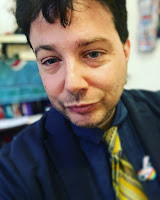Five Things I Do in My Classroom That Just Work
(Even if there’s no rubric for them)
There are things I do in my classroom that just work—but I’m not sure there’s a teacher rubric for them. Maybe they’re not “standard” in education. Still, I do them anyway.
1. I give out stickers.
I know, I know. I’ve read all the teacher blog posts and watched the TikToks that say: “Get rid of the cute stuff. Kids need consistency, not stickers.” And I get it. I don’t hand out a sticker every single class period. But I do love giving out stickers. Cute ones. Fun ones. The kind that make a kid smile. And guess what? It works—with seniors, with middle schoolers. Kids like stickers. I like stickers. It’s a small gesture that makes the classroom feel human.
2. I build consistency—but I’m not married to the format.
Yes, I believe students need to know what to expect when they walk into the classroom. Maybe it’s a predictable structure: a warm-up on grammar, a chapter discussion, small group work, and an exit ticket. That kind of rhythm can be calming. But I also think it’s okay to play around with the model sometimes.
For example, sometimes I lecture. I know that’s considered a dirty word in modern pedagogy, but sometimes students need direct input. A 10–15 minute mini-lecture—on something visual and engaging, like Raphael’s School of Athens—can be powerful. Talk about Plato and Aristotle in the center, point out Raphael’s self-portrait. Deliver it like a college professor would. Then have students write Cornell notes, draft questions, or summarize the lecture. Students need input and output. The balance matters.
3. I prioritize discussion—and I make it real.
I love classroom discussion, but I know it can fall flat if the setup isn’t right. Sometimes teachers over-protocol it. Other times, the discussion questions just aren’t juicy enough. You’ve got to trust your kids and ground the discussion in something compelling.
Here’s a simple method that works for me: I put a theme on the board and ask students to find three textual moments that relate to it. I give them three minutes. Then I pull names from tongue depressors (old-school but effective). Each student shares one quote, and then we discuss it: “What do you think?” “What does someone else think about that?” “Who has a counter-opinion?” It’s structured, but not rigid. And it opens up rich conversations.
Sometimes, we skip the text entirely and go for the big questions:
- What is the meaning of life?
- How do you know if someone is truly your friend?
Those social, philosophical moments build community. They’re worth the time.
4. I preview everything.
One hard-earned lesson: Always preview activities with students. I used to spring things on them and then get frustrated when it didn’t go well. Now I let them know:
“Tomorrow we’re having a discussion. It’ll be 20 minutes, after our book work. No homework, but check Google Classroom if you want to see the questions ahead of time.”
Previewing helps students mentally prepare. And if I know certain students might struggle, I make a point of checking in with them ahead of time.
5. I believe in co-teaching—and wish more schools did too.
I’ve worked in co-teaching models, and I’m convinced: this is the future of education. The biggest problem in schools today is what I call scope creep. You start out as a sixth grade ELA teacher. Suddenly you’re also the debate coach, an advisor, the parent liaison, the field trip organizer… It’s too much.
Instead of pouring money into layers of admin, why not invest in teachers? Every class could have two teachers. Cap class sizes at 21. Let APs and coaches teach. Let co-teachers build a shared scope and sequence, check in weekly, and split responsibilities. I’ve seen it work. It can be transformative.
But instead, too many schools gaslight teachers:
“I don’t know why this class isn’t working out for you…”
Maybe because you’re expecting one human to do the work of three?
Final Thoughts
I’m not saying there’s one perfect way to teach. But I know what works for me. Stickers, mini-lectures, juicy discussions, transparent expectations, and a genuine co-teaching model. These things aren’t always in the playbook—but they should be.
PDF Copy for Printing




